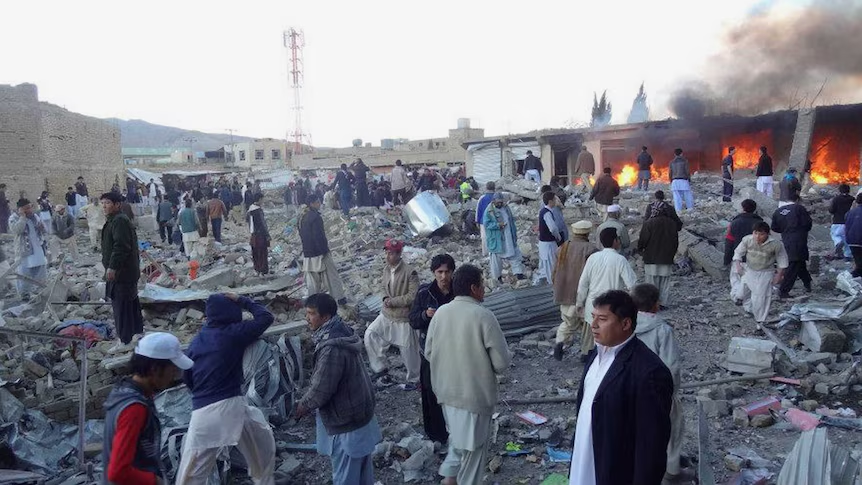Quetta Burns — The Terror State Finally Eats Its Own, While the World Keeps Handshakes Ready
By BK Singh
A powerful car bomb detonated outside the Frontier Constabulary headquarters in Quetta on Tuesday, followed by a fierce gun battle that left at least ten people dead and dozens wounded.
CCTV and eyewitness footage show the attackers driving up, opening fire, and then the vehicle exploding at the compound gate — a blast so forceful it shattered windows for blocks and turned yet another Pakistani city into a bloodied tableau of terror.
Security forces later reported that the assailants were killed.
Don’t call this an “incident.” Call it a consequence.
For decades, Pakistan’s military-intelligence complex has cultivated, funded, and sheltered militant proxies — Lashkar-e-Taiba (LeT), Jaish-e-Mohammed (JeM), the Haqqani Network, among them — and used them as instruments of state policy against neighbours and rivals.
These forces carried out some of the most infamous massacres in the region: Mumbai-2008, Pulwama, repeated strikes in Kashmir, and attacks that bled Afghanistan.
The Frankenstein’s monster, Pakistan lovingly raised to bite India and others, now gnaws at Pakistan itself.
If you need a first-hand admission of that policy, Pakistan’s own Defence Minister said it plainly in a recent international interview: Pakistan “has been doing this dirty work for the United States and the West for about three decades.”
Whether he meant confession, cynicism, or self-criticism, the words are a public record — a damning acknowledgment that terror was long treated as a tool of statecraft.
If Islamabad’s officials say this on camera, the rest of the world cannot pretend it didn’t know.
And yet the geopolitical farce rolls on.
Just days before the Quetta carnage, President Donald Trump hosted Pakistan’s Prime Minister Shehbaz Sharif and Army Chief Field Marshal Asim Munir in the Oval Office, exchanging smiles, handshakes, and photo-ops that read like diplomatic approbation.
Those official embraces — captured in the White House photo gallery — are grotesque theatre if you remember that Pakistan once harboured Osama bin Laden in Abbottabad, within sight of a military academy, and that Pakistani soil has repeatedly been linked to the planning and support of cross-border terrorism.
This is the hypocrisy at the heart of contemporary geopolitics: Washington praises “peace deals” and brokered ceasefires on one stage while cosseting the very generals whose institutions have tolerated, enabled, or even used jihadi proxies on another.
The result is predictable: the state that exported terror is now paying the price in its own cities, and the world is largely culpable for looking the other way.
Make no mistake — the Quetta blast is not isolated. Baloch separatists, Islamist militants, and the Islamist-proxy ecosystem have each, in different ways, wreaked havoc in Balochistan and beyond.
But the deeper indictment is structural: a part of the Pakistani establishment weaponized extremist networks; those networks metastasized; and today Pakistan confronts the blowback.
The blood on Quetta’s streets is paid for by policies hatched in the service of short-term geopolitics.
So what must the world do? Diplomacy without teeth is complicity. The following must happen now:
• Immediate targeted sanctions against identified ISI-linked front entities, financiers, and named facilitators who enable LeT, JeM, Haqqani, and allied groups. Freeze assets, choke financial channels, and shutter the conduits of terror money.
• An arms embargo on Pakistan — no advanced weapons, no dual-use technology, no transfers that can be diverted to proxy operations — until verifiable dismantling of sanctuaries occurs.
• Diplomatic downgrades and suspension of high-level military cooperation with the parts of the state that use proxies as policy instruments. Photo-ops do not excuse complicity.
• UN and FATF action: mandate independent UN fact-finding into state-proxy linkages and reapply stringent FATF measures to dismantle terror funding networks.
• Legal accountability: pursue criminal and civil avenues against those who materially supported transnational terrorism where evidence exists. International law must not be a buffet of selective enforcement.
These are not rhetorical demands — they are survival measures. A nuclear-armed state with an active terror-industrial complex is not a regional problem only; it is a global hazard.
And one final truth: the indulgence of Pakistan’s leaders by powers that call themselves guardians of the rules-based order is both political incompetence and moral failure.
You cannot boast of leading on counter-terrorism, hold photo-ops with generals who tolerated or nurtured proxies, and expect history to give you the benefit of the doubt.
The Oval Office and other capitals must choose: either stop giving legitimacy to those who feed terror, or accept responsibility for the next massacre.
Quetta should be a turning point. If the world allows the same people and institutions that created the monster to continue business as usual, then every handshaking photo becomes an enabling document.
The next blast will not be someone else’s tragedy. It will be a consequence of the world’s decision to keep smiling at the men who supplied the bombs.
#QuettaBlast #PakistanTerrorState #StateSponsorOfTerror #SanctionPakistan #LeT #JeM #HaqqaniNetwork #USHypocrisy #NoMorePhotoOps #GlobalSecurity




